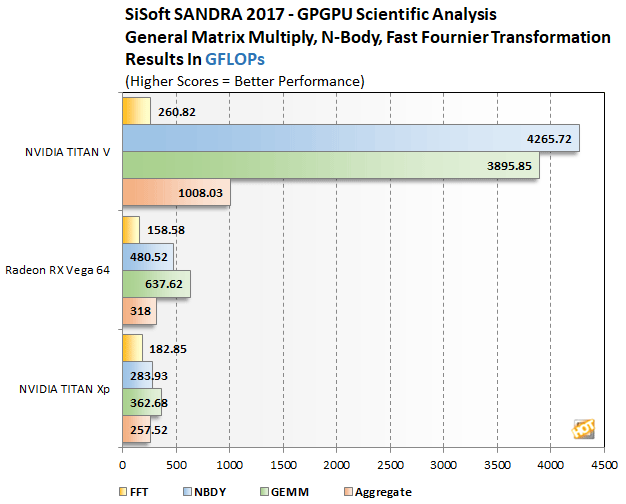SANDRA's Scientific Analysis benchmark uses
OpenCL and runs though an array of General Matrix Multiply (GEMM), N-Body Simulations (NBDY),and Fast Fournier Transformation ops and reports the overall speed. An aggregate result is generated as well...
|

|
| SiSoft SANDRA 2017 |
| Scientific Analysis Benchmark |
|
There is simply no comparison here. The TITAN V's aggregate performance is approximately triple that of the Vega 64 or TITAN Xp, but its individual results show the card offering many times the performance of the other cards in the GEMM and NBDY tests.
 |
|
LuxMark v3.1 |
|
OpenCL Benchmark |
|
LuxMark is a cross-platform, OpenCL-accelerated 3D rendering benchmark. It's a tool based on the open source LuxRender physically-based spectral rendering engine, which accurately models the transportation of light and supports high dynamic range. LuxRender features a number of material types to allow rendering of photo-realistic and artistic scenes. LuxRender is free software, licensed under the GPL, that offers plugins for packages like Blender, Maya, Cinema 4D and 3DS Max.

LuxMark is typically a strong point for AMD Radeon-based cards, but the TITAN V more than doubles the performance of a Radeon RX Vega 64 here, and the TITAN Xp isn't much faster.
|

|
| Ethereum Crypto-Currency Mining |
| Claymore GPU Miner In Action |
|
Although
cryptocurrency mining isn't all that practical on a 250 watt, $3,000 graphics card, we wanted to see what the TITAN V could do mining
Ethereum nonetheless, to give us a glimpse of the potential of future, consumer-targeted, Volta-based graphics cards, should they ever be produced. As you can see, the TITAN V is an absolute mining beast. Right out of the box, with no tuning whatsoever, it's nearly 84% faster than the TITAN Xp or
Vega 64. And with some simple overclocking (upping the power and temp targets, and boosting the memory clock by 155+MHz), the TITAN V's hash-rate broke the 82MH/s barrier, more than doubling the performance of the other cards.





